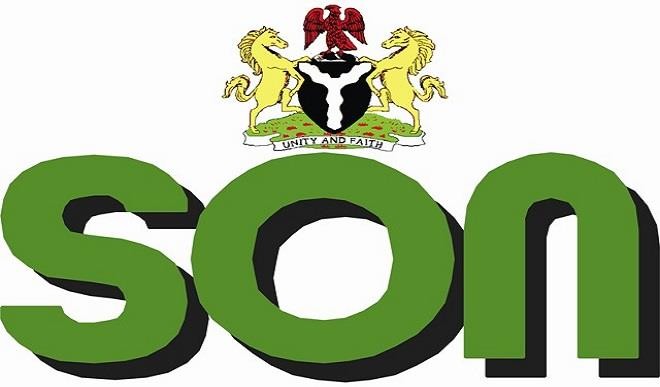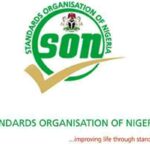The Standards Organisation of Nigeria (SON) has intensified the enforcement battle against substandard products using its enabling laws.
The SON Act 2015 provides for criminal proceeding against any person who violates the law by using a fake mark or not complying with the applicable industrial mark.
- SON approves 168 standards for economic activities
- SON urges condiments producers on compliance with standards
To this end, SON has charged several suspects for various acts of counterfeiting and production/importation of substandard products and has secured several convictions.
On July 24, 2020, the agency secured the conviction of two men, Uche Johnson and Kingsley Meteke, at the Federal High Court in Lagos, for producing and distributing substandard engine oil.
Justice Oluremi Oguntoyibo convicted and sentenced them to two years imprisonment each after they pleaded guilty to the offence. They admitted to have adulterated 128 drums and 9.45 litres of engine oil.
SON charged them with four counts of production, possession, dealing in and distribution of substandard engine oil which did not meet mandatory industrial standards. The products failed to comply with the Standards Organisation of Nigeria’s (SON) Conformity Assessment Programme (SONCAP).
According to SON, the offence contravened Sections 1(8) and 1(8)(II) of the Miscellaneous Offences Act, 2004.
The agency also secured the conviction of Mr Shodipo Olujimi and another who were charged with the forgery. It also ordered that Olujimi’s company be wound up.
There are several other cases being prosecuted by SON in court.
SON recently charged an Indian and two others for forging SON receipts. Chucks Okeke, Omkar Shinde, Shittu Adedeji and a company, Everchem Paints Nigeria Limited, were arraigned before Justice Saliu Saidu of the Federal High Court in Lagos on a three-count charge of forgery.
Senior State Counsel Olofindare Adeleke alleged that Okeke and Shinde, an Indian, and Everchem Paints, forged 15 SON receipts on February 12, 2020, at Close 6, House 4 Satellite Town, Lagos, and at 110/114 Oshodi Apapa Expressway, Isolo.
He said the defendants committed the alleged offence “With intent to use the false documents as genuine”. The defendants pleaded not guilty.
SON also charged a businessman, Ifeanyi Okoli, who allegedly imported 120,000 brands of substandard electric cables in 13 containers.
Okoli was arraigned on a three-count charge of conspiracy and importation of substandard goods. Okoli’s co-defendant is Natures Breeze Ltd.
SON alleged that Okoli, 34, of No 5, Igbeyin Adun Street, Shibiri, Lagos, and Natures Breeze of the same address, committed the offence on or about October 31, 2019, and at the latter’s warehouse.
Prosecution counsel, Babatunde Alajogun, said both defendants conspired to import “about 120,000 different brands of substandard electric cables in 13 containers.”
Okoli pleaded not guilty.
In another case, SON charged a businessman and a welder who allegedly broke into a sealed warehouse to cart away substandard electric cables confiscated by the agency.
The two are Chukwuma Nwodo, 31, and Abor Ikechukwu, 21.
Chief State Counsel Mr Babatunde Alajogun, who represented the Attorney-General of the Federation (AGF), told the ccourt that the defendants committed the offence on or about August 21, 2019 at a warehouse behind Bengass Motor Park, Ojo-Alaba.
“They conspired to destroy SON’s seal which was used to seal up the warehouse which contained substandard cables using welding equipment,” he said.
SON said both men carried out the destruction using welding equipment and gained entrance into the warehouse “to cart away the substandard electric cables.” Nwodo and Ikechukwu pleaded not guilty.
In yet another case by SON, the Federal High Court in Lagos remanded two businessmen, Emmanuel Anthony Nnan and John Paul Ejike in prison custody over importation and sale of substandard gas cylinders. The duo pleaded not guilty to the charges.
SON Director-General Barrister Osita Aboloma said top on the list of seizures were adulterated lubricants, electric cables and cylinders.
Aboloma said the SON Act was a revolutionary document which the agency was deploying towards ridding the country of unwholesome products.
“Let me inform you that the big hauls of seizures which the agency made are a testimonial that we mean business by harnessing to the fullest the enormous powers which the Act has accorded us,” he said.

“Within the last few months of 2019, we confiscated fake and substandard products worth over N300 billion across the country.
“We have since embarked on arraignment and trial at various courts of some of the suspects linked with the impounded goods. We are not resting on our oars.
“Operators are urged to always certify their products’ quality with SON in order to make made-in-Nigeria products and services good to go anywhere in the world,” Aboloma added.
He reassured consumers of the quality and safety of locally-made and imported goods.
“It, therefore, behooves operators to deliver on consumers’ expectations.
“All products manufactured in Nigeria must be certified to the Nigerian Industrial Standards (NIS) through the agency’s Mandatory Conformity Assessment Programme (MANCAP), which is subject to legal enforcement.
“All imported products must be certified to the Nigerian Industrial Standard (NIS) or other approved standards through SON’s Offshore Conformity Assessment Programme (SONCAP).
“Product registration and certification is a vital tool for product competitiveness,” Aboloma said.
The SON DG noted that the SON Act 2015 provides for criminal proceeding against any person who violates it by using a fake mark or not complying with the applicable industrial mark.
“By Section 28, ports of special entry are to be designated for the purpose of standardisation. Goods or products designated as such can only be imported through such a port. Contravention is criminal.
“A person so convicted pays not less than N2 million fine or be jailed for five years or both.
“Section 29 allows the director-general to proceed against hazardous products.
“It prohibits sale of such products, allows the director-general to apply to court, seal up premises, direct the person to rectify the deficiency, etc.
“The power given to the D-G herein is novel. It prohibits the police from undertaking this duty, for which they are not familiar,” he stated.
Section 30 gives the director-general and SON employees powers to enter upon suspected premises, and Aboloma has vowed to intensify the enforcement of the act.
SON’s efforts have not gone unnoticed. Organisers of The Eagle Awards and Banquet, honoured the SON DG with an award for meritorious public service.
The award took recognition of the efforts of Aboloma in containing substandard products in the country, and also creating an enabling environment for indigenous entrepreneurs to thrive.
The D-G was particularly commended for his efforts in enhancing the ease of doing business in the country by creating opportunity for Nigerian products.

 Join Daily Trust WhatsApp Community For Quick Access To News and Happenings Around You.
Join Daily Trust WhatsApp Community For Quick Access To News and Happenings Around You.


